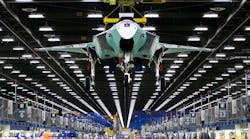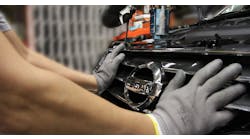Lockheed Martin is suing one of the major suppliers to its F-35 Joint Strike Fighter jet program, alleging that Howmet Aerospace exceeded its contractual rights in raising its price for titanium products and separately that Howmet’s position threatens national security by delaying deliveries of completed aircraft.
Howmet has responded that it has complied with its contractual and regulatory obligations, and blamed the global shortage of titanium raw materials since the February 2022 invasion of Ukraine by Russia, which is a primary source of titanium sponge.
Titanium sponge is material that results from the first stage of refining titanium ore. It is a raw material for refining titanium metal and forming ingots or billets that can be alloyed and cast into structural parts or rolled into flat or long products.
The F-35 is a series of single-engine, Stealth-enabled aircraft deployed for ground attack and combat, and available in three variants. It is by far the largest and most expensive U.S. defense program, with Lockheed subject to steady scrutiny for cost overruns and the readiness of aircraft for service.
Howmet manufacturers jet engine components, aerospace fastening systems, and airframe structural components for commercial and defense aircraft builders. Its contributions to the F-35 program include forged aluminum bulkheads and titanium bulkheads, and titanium metal used to manufacture other airframe structures, as well as single-crystal, nickel-based superalloy blades and vanes; rolled rings, and fasteners.
In a release commenting on the Lockheed suit, Howmet blamed Russia’s invasion of Ukraine for drastic price increases by its titanium sponge suppliers, “contrary to their agreements with Howmet.” It added that this situation was exacerbated by “Lockheed Martin permitted customers to sell their revert scrap metal to third parties rather than provide it to Howmet as contractually required. This allowed the Customers to profit from highly inflated prices on the open market.”
Howmet claimed it continued to purchase titanium sponge and titanium scrap metal on the open market in order to supply the F-35 program, and that it has been “transparent with Lockheed Martin about these challenges and has acted in good faith to attempt to reach a reasonable resolution for the benefit and long-term health of the F-35 program.”
According to Howmet, those discussions were ongoing when Lockheed “chose to file a meritless lawsuit seeking to compel Howmet to continue to supply product at prices that no longer reflect commercial reality and on terms that Howmet believes it is not contractually obligated to provide.”
The supplier noted it remains open to discussing a “reasonable resolution.”






